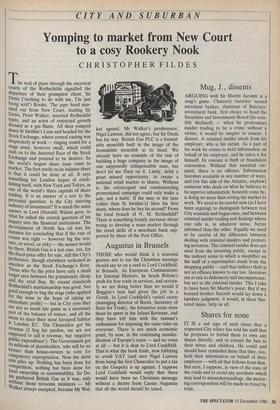Mug, J., dissents
ARGUING with Sir Martin Jacomb is a mug's game. Chancery barrister turned merchant banker, chairman of Barclays' investment bank, first choice to head the Securities and Investments Board (he sens- ibly declined) — when he pronounces insider trading to be a crime without a victim, it would be simpler to concur. I dissent. A criminal insider steals from his employer, who is his victim. As a part of his work he comes to hold information on behalf of his employer, and he takes it for himself. Its essence is theft or fraudulent conversion. Without that essential ele- ment, there is no offence. Information becomes available in any number of ways, and (on this side of the Atlantic, anyhow) someone who deals on what he believes to be superior information, honestly come by, is doing no more than setting the market to work. We need to be careful now (as I have been arguing) to distinguish between real City scandals and bogus ones, and between criminal insider trading and dealings where one side is, in whatever sense, better informed than the other. Equally we need to be careful of the difference between dealing with criminal insiders and protect- ing investors. The criminal insider does not steal from the investing public, except in the indirect sense in which a shoplifter on the staff of a supermarket steals from the shopping public — and that indirect theft is not an offence known to our law. Investors are at risk to dishonesty and incompetence, but not to the criminal insider. This I take to have been Sir Martin's point. But if my learned brother Jacomb would lay down a lapidary judgment, it would, in these flus- tered times, help us all.


































































 Previous page
Previous page